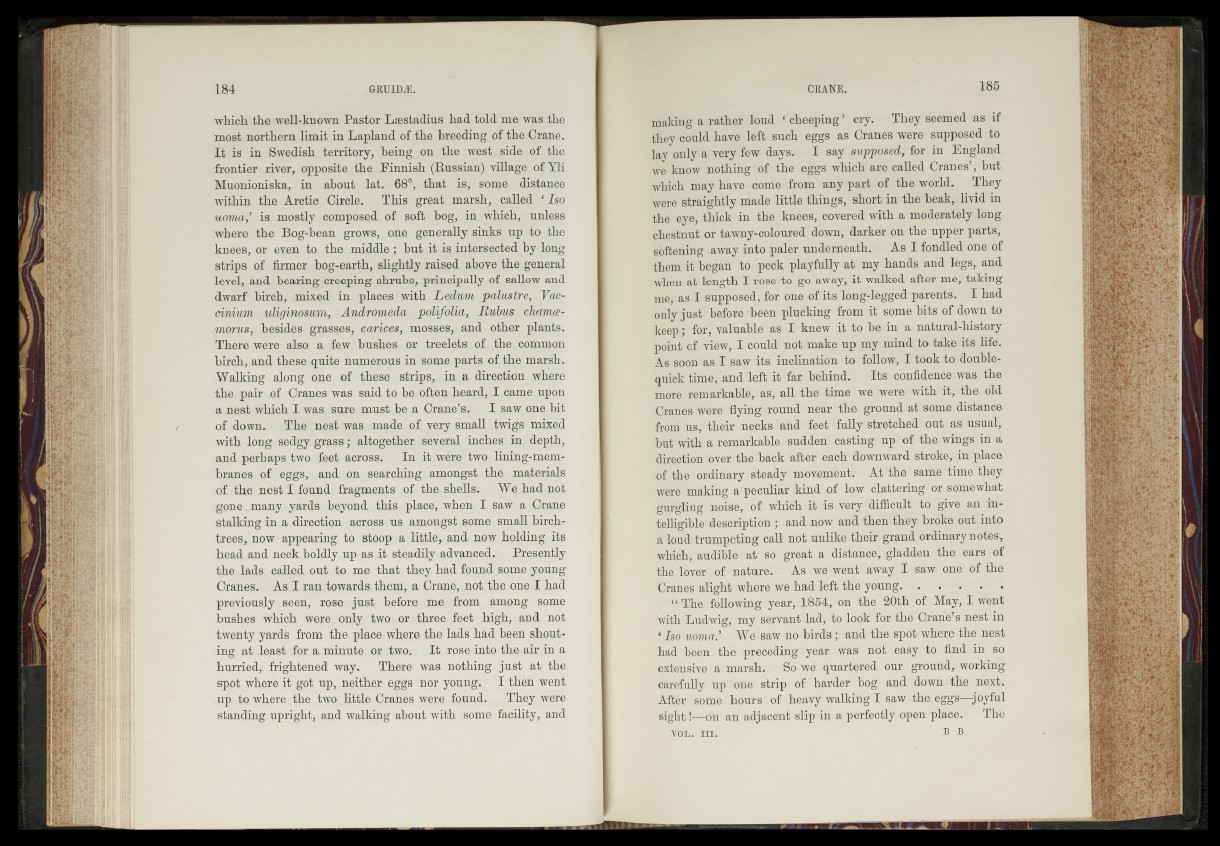
which the well-known Pastor Lsestadius had told me vas the
most northern limit in Lapland of the breeding of the Crane.
It is in Swedish territory, being on the west side of the
frontier river, opposite the Finnish (Russian) village of Yli
Muonioniska, in about lat. 68°, -that is, some distance
within the Arctic Circle, This great marsh, called ‘ Iso
norm,' is mostly composed.of soft bog, in which, ^unless
where the Bog-bean grows, one generally sinks up fo the
knees, or even to the middle; but,it is intersected by long
strips of firmer bog-earth, slightly raised above the general
level, and bearing creeping shrubs, principally of sallow and
dwarf birch, mixed in places: with Ledytin palustre, Yao-
ciniym uUginpsum, Andromeda tpjoliJpJ/ia, Rubus cfyggn&r
morus, besides grasses, carices, mosses,, and other plants.
There were also, a few bushes or treelets;.of the common
birch, and these quite numerous in some parts of the marsh.
Walking along one of these' strips,. in, a direction v|here
the pair of Cranes was said to be often heard, I came upon
a nest which I was sure .must, be .a iprane’s.; I saw one bit
of down. The , nest, was made of very small twigs mixed
with long sedgy grass; altogether several inches'.in/.depth,
and perhaps, two-.feet, across. In it were two lining-membranes
ef eggs,., and on searching, amongst the materials
r©£ the nest I found. fragments e h the shells. -^ e ,h ad not
gone.many yards beyond, this, placed whanj^||saw a-.C’rane
stalking in a direction iapro.sg us. .amongst^some small hi-rch-
trees, now appearing to stoop a little, and now hoj^hl'g i l |
head and neck holdl-y .up as it steadily advanced.., Presently
the. lads called out .-to me that th,ey had found some young
Cranes. As I ran towards them, a. Crane, fee-one I had
.previously seen, rose* just before me from, amongv|ome
bushes which were,only two or three feet-high. and;not
twenty yards from the place udigre the lads had been shouting
at least, j§££a minute or two. Itsg:ose4int%j^^air in a
hurried, frightened way. There was nothing just at- the
spot where it gotr up; neither eg]*s ^or*young. 1 I ffibn went
up to yfeere the t^g.,little Cranes wprp? |bqnd,f .They $yerc
standing upright, and walking about with some facility, and
making a rather loud ‘ cheeping’ cry. They seemed as if
they could havé- left such eggs as Cranes were supposed to
lay only a very few days. I say supposed, for in England
we know nothing of the eggs which are called Cranes’, but
which may have come from any part of the- world. They
were straightly made little things, short in the beak, livid in
the eye', thick in the knees, covered.with a moderately long
chestnut or tawny-coloured down, darker on thé upper parts,
softening away into paler underneath: As I fondled one of
them-it-began to peck playfully at my hands and legs-, and
when -at % ngth T rose' to go-away, it walked after me,-taking
me,' as T supposed, for one-of its long-legged parents* • : I had
ehly -just ; before been-plunking from it some "bits-of down to
keep fMóv-j valuable * as I knew it -to be in -a natural-history
poinf of -view, I could* not make up my mind to take its life.
As soon' as I saw its inclination-to follow-, Tdookdo double-
quibk-time, and left it-far behind.. -Its confidence was the
more remarkable, as, all the time we-were < with it / th e old
'Cfanes-were flying round n e a r1 the ground at-some distance
from us, their necks and feet fully stretched''-out .as-usual,
but with a remarkable--Sudden- casting up of the wings in a
direction" óvéwthe back after' each downward stroke, i n pl-kce
oMhd; ordinary steadybm^veméntï I At the s am e d iW th e y
were -making a peculiar kind of- iow^clattermg- Oï- somewhat
gurgling r of ‘ which very difficult to give an intelligiblëdescriptien^
and new'and'then:they broke ©hf into
a loud trumpeting call not unlike their griend ordinary notes,
which, audible at so' great a distance; gladden’ the d 'a rf lof
lover-'of'-’n a t u r e ^ >A^sweïwèntiaway I saw-' one ?ofvthe
Cranes alight where’we had left.'fee young.- . *: - :
fitli/Ehb^following -year, 1854, ten fed Qttth.bf/lla'y, I went
withtL'Mwig^my- servant lad, iodook for fee Crane’s 'n e s tin
^Iso^uómé.1- "iWe’ saw no*bird¥;; and th e -sjpipfcwhére fee -ne st
had b%eh%fe% -preceding-year-was nofeeaiy- to fendr in so
extensive’ a marshfe-sii© we quarteredtted# ground,' working
-^f^Suliy b p iB&fèf strip» of harderfeog and dow n 'fee bhxifes
After some hours’ of feeavy w alking I saw'the:eg§ste-jpyfui
sighfjiSlïa ah adjacent slip in a perfectly open place'. The